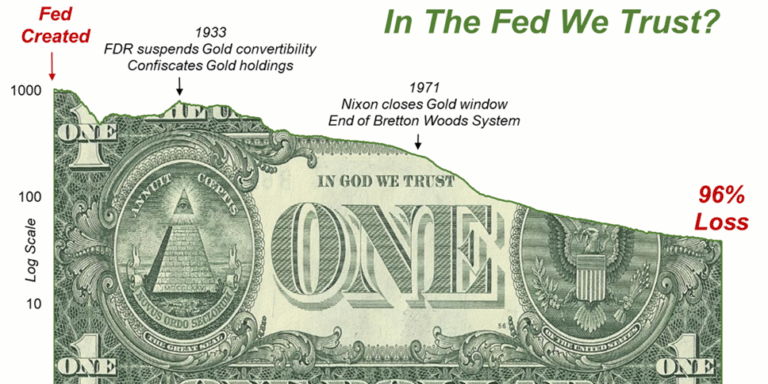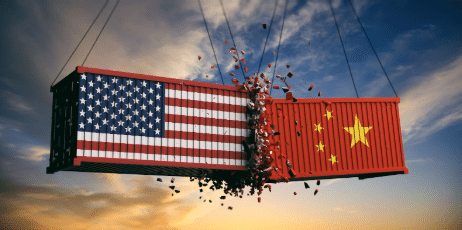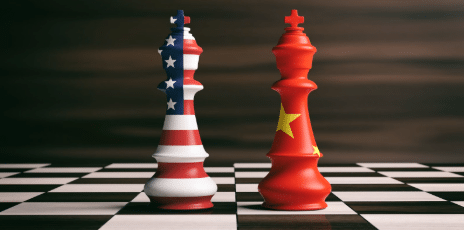
Does The "New Bretton Woods Moment" Have Implications for Deflation?
EDITOR NOTE: This article is a bit clunky but it does point to the possibility of (or anticipation for) another Bretton Woods moment, with the IMF at the helm of the conversion. But what would that be? Not every country will agree to going back to a gold standard. If not gold, then what? Instead of mentioning the IMF’s SDR’s as an alternative, the author instead goes back to Keynes’ historical recommendation of a “Bancor,” which is pretty much the same thing. Of course, all of this is predicated on global cooperation. Countries are much too localized, as virtually all people are in one way or another. Such cooperation is a pipe dream, if not a theoretical construct that won’t be able to weather reality when it hits. In the end, gold prevails as the most viable option. That’s where the author somehow clunkily misses the point.
The global elite, predictably, will not let a crisis go to waste.
Back in 1995, as the golfing world was starting to notice the birth of a superstar, the British golfer Sandy Lyle was asked a question by a journalist. “What do you think of Tiger Woods?” was the query. To which Lyle genuinely replied, “I don’t know, I’ve never played there.”
Bretton Woods, a picturesque resort in the state of New Hampshire, does have a golf course, but it is most famous for the 1944 conference at which the international financial order was decided as World War II drew to a close. The Bretton Woods System of international finance, which created the International Monetary Fund (IMF) at its core, lasted only two and a half decades before it blew up, the death knell being when U.S. President Nixon stopped the convertibility between U.S. dollars and Gold in 1971. Since then, monetary inflation has raged throughout the developed world and beyond, creating the biggest debt bubble in the history of humanity.
But just as the 1944 agreement emerged from a global crisis, there are signs that the current crisis might cause another new world order to be born. This speech last week from Kristalina Georgieva, the current IMF Managing Director, titled “A New Bretton Woods Moment,” could be a clue that once the dust settles from 2020’s health and economic crisis, the powers that be might be thinking about a new way of doing things. What might be considered and what will it mean?
Taking it at face value, one might be inclined to think that the IMF wants to move back to a Bretton Woods type of system. Under that process, exchange rates were fixed as was the U.S. dollar to Gold. But hold on: that system proved to be way too much of a constraint for countries, resulting in its demise and the monetary inflation-fest of the past 50 years, as encapsulated in the chart below, accelerating the trend of currency debasement ever since the Federal Reserve was created in 1913. Would countries like the U.S., hopelessly addicted to money creation and debt, agree to such an inflation straitjacket? I don’t think so. If, incredibly, a system like that was agreed to, perhaps with gold having a link again, monetary deflation would become commonplace as countries could not just print money willy-nilly.
But, as Baldrick used to say to Blackadder, someone might have a cunning plan.
John Maynard Keynes, the celebrated British economist, was one of the main architects of the Bretton Woods System. However, his initial plan was rejected. What he had first wanted was that the IMF simply invents a currency for accounting purposes, and he gave it the name Bancor. The idea was that global economic imbalances could all be smoothed out via individual countries borrowing and lending Bancor via the IMF. Rather than having an inbuilt constraint, though, as the final Bretton Woods Agreement did, Keynes’s plan was that there would always be enough Bancor to grease the wheels of global trade and finance, because the IMF would simply create it out of thin air. Essentially, Keynes wanted a global central bank with the ability to print as much “money” as it wanted.
That might be a neat conclusion to the past 50 years of monetary insanity, but the implications for individual countries are unclear. Taking the broad view, though, should something like Bancor or any other monetary system that involves international co-operation develop, the inevitable loss of control of sovereign central banks will probably point to less monetary inflation, not more. (From a socionomic point of view, the possibility of international co-operation at this juncture if our bearish stock market Elliott wave thesis is correct is a pipe dream, but that’s for another story).
Whatever happens to the global financial architecture in the next few years, it certainly is beginning to feel like major change is coming. Stay tuned to EWI and deflation.com to take advantage of that change.
Originally posted on Deflation.com
The financial market is crumbling and EVERYONE will be affected. Only those who know what's going on and PREPARE will survive... dare we say thrive. Our 7 Simple Action Items to Protect Your Bank Account will give you the tools you need to make informed decisions to protect yourself and the ones you love.








